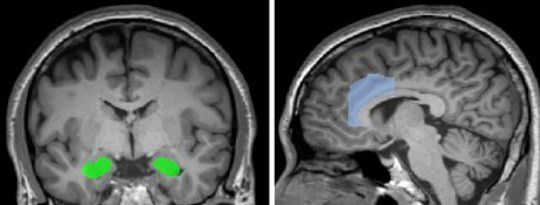
Everyone knows someone with a quick temper – it might even be you. And while scientists have known for decades that aggression is hereditary, there is another biological layer to those angry flare-ups: self-control.
In a paper published earlier this year in the Journal of Cognitive Neuroscience, my colleagues and I found that people who are genetically predisposed toward aggression try hard to control their anger, but have inefficient functioning in brain regions that control emotions.
In other words, self-control is, in part, biological.
Genetic explanations for social behaviour tend to be unpopular – and for good reason. The notion that some of our interactions with fellow humans may be partially determined by our ancestry goes against the “all people are created equal” or “fair go” ethos of democratic societies.
Get The Latest By Email
Detractors of genetic causes of social behaviour are often on the right track. Many personality characteristics are only moderately influenced by genes. But whether we like it or not, aggressiveness is one social behaviour that has a particularly strong genetic basis.
A Violent History: Hunter-Gatherers' Survival Mechanism
Aggression is with us today because in our ancestral past, it helped our forebears survive and reproduce. It’s hard to imagine now, but before there was third-party justice such as police, people often had to protect themselves with violence, or the threat of violence, and secure resources through raiding and warfare. Until about 12,000 years ago, all humans lived as hunter-gatherers – and hunter-gatherer society was riddled with violence.
Research conducted decades ago by anthropologists who lived with exceptionally violent hunter-gatherers found that hunter-gatherer men who committed acts of homicide had more children, as they were more likely to survive and sire more offspring. Thus, we may all be here today because of violence in our ancestral past.
We still see remnants of our evolutionary history through twin studies. These studies show that approximately half of the individual variation in aggressiveness is inherited. More recently, since the decoding of the human genome, scientists are able to examine variation in specific genes related to neurotransmitter functioning to evaluate their relationship with aggressiveness.
The Responsible Aggression Gene: MAOA
The most robust association between a specific gene and aggression in humans is the monoamine oxidase A (MAOA) gene. Men – who commit nearly all extreme acts of violence (sorry guys) – can have a high-functioning or low-functioning version of the gene. (Women can also have an intermediate version.)
The relative importance of this gene comes from its role in regulating the functioning of neurotransmitters (such as serotonin and dopamine), which help regulate emotions. Several studies have found that men with the low-functioning version of the gene are especially likely to engage in violence and other antisocial behaviour if they were exposed to childhood abuse.
Even more recently, psychology experiments from two independent laboratories found that research participants with the low-functioning allele were more aggressive than people with the high-functioning variant, but interestingly only when provoked. What is perhaps remarkable is that these research participants were mentally healthy university students.
These findings suggest that people with the low-functioning variant of the MAOA gene may be less proficient in controlling anger and aggressive behaviour. But our understanding of the importance of control, when it comes to a genetic predisposition toward aggression, is incomplete.
Visualising Violence In The Brain
My colleagues Carol Dobson-Stone, Richard Ronay, William von Hippel, Mark Schira and I imaged the brains of 38 men genotyped as having the high- or low-functioning gene while exposing them to provocation.
We first allowed each of them to get comfortable in the scanner after which we subsequently insulted them by telling them in an angry tone that they screwed up our study (don’t worry – everyone was debriefed at the end of the study and left in a good mood).
We found that men with the low-functioning variant showed hyperactivation in two key brain regions involved in emotion and emotion regulation: the amygdala and the dorsal anterior cingulate cortex.
 Location of amygdala (left) and dorsal anterior cingulate cortex (right).
Location of amygdala (left) and dorsal anterior cingulate cortex (right).
Men with the high-functioning variant did not show this hyperactivation. In turn, the degree of hyperactivation in these parts of the brain was correlated with how hard they tried to control their anger.
Trying Harder May Not Be Good Enough
Although the evidence for the MAOA gene conferring risk for violence is relatively strong, possessing the low-functioning variant is by no means deterministic. Approximately 35-40% of the male population has the low-functioning variant, but clearly only a very tiny fraction of these men will go on to commit a serious act of violence in their lifetimes.
Genes may be half the story, but that is it – they are only half the story. We found that men with the low-functioning variant of the MAOA gene seem to have inefficient functioning in the neural circuitry of emotional control. This inefficient functioning may predispose people with the low-functioning variant toward aggressive responses to provocation. People with the high-functioning variant seem to be better able to “brush it off”.
By identifying genes and brain mechanisms that predispose people to the risk of being violent – even if the risk is small – we may eventually be able to tailor prevention programs to those who need them most.
There is already genetic research that identifies people who are most likely to benefit from exercise regimes and certain drugs and identifies cancer risk. Provided there is informed consent and protection from information misuse, why not use genetic information to help people control anger and aggression? Doing so could greatly benefit aggressive people and those around them.
This article originally appeared in The Conversation
About the Author
 Tom Benson is an Associate Professor of Psychology, University of New South Wales. He is an experimental social psychologist interested in the causes and consequences of anger and aggression. He received his PhD from the University of Southern California in 2007 and has received numerous awards: a DECRA Fellowship from the Australian Research Council, the Association for Psychological Science’s ‘Rising Star’ award, the Society for Australasian Social Psychology’s Early Career Researcher Award, and the NSW Young Tall Poppy Science Award. He is an Academic Editor at PLOS ONE (an inclusive, peer-reviewed, open-access resource from the Public Library of Science).
Tom Benson is an Associate Professor of Psychology, University of New South Wales. He is an experimental social psychologist interested in the causes and consequences of anger and aggression. He received his PhD from the University of Southern California in 2007 and has received numerous awards: a DECRA Fellowship from the Australian Research Council, the Association for Psychological Science’s ‘Rising Star’ award, the Society for Australasian Social Psychology’s Early Career Researcher Award, and the NSW Young Tall Poppy Science Award. He is an Academic Editor at PLOS ONE (an inclusive, peer-reviewed, open-access resource from the Public Library of Science).
Recommended Book:
Outsmarting Anger: 7 Strategies for Defusing Our Most Dangerous Emotion
by Joseph Shrand, MD & Leigh Devine, MS.
 Seven innovative yet remarkably uncomplicated strategies to help turn powerful anger impulses into positive, success-oriented actions. These brain-based techniques teach you how to recognize the many forms of anger we all experience, and how to tap into your brain's very own anger absorption zone the prefrontal cortex. Outsmarting Anger helps you manage and decrease not only your own anger, but the anger of people around you so everyone can be more successful. (Published in partnership with Harvard Health publications, a division of Harvard Medical School)
Seven innovative yet remarkably uncomplicated strategies to help turn powerful anger impulses into positive, success-oriented actions. These brain-based techniques teach you how to recognize the many forms of anger we all experience, and how to tap into your brain's very own anger absorption zone the prefrontal cortex. Outsmarting Anger helps you manage and decrease not only your own anger, but the anger of people around you so everyone can be more successful. (Published in partnership with Harvard Health publications, a division of Harvard Medical School)
Click here for more info and/or to order this book on Amazon.







